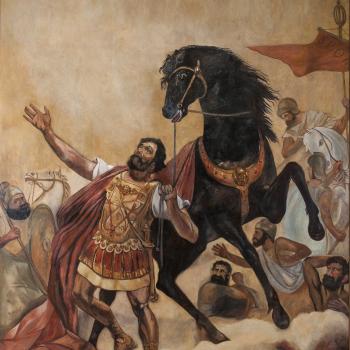It is often said that the Bible contains no clear denunciation of slavery as an inherently evil institution. While Biblical inspiration animated the abolitionist movement, it’s also (unfortunately) true that enslavers also used the Bible to justify the sinful practice of owning fellow human beings. That said, we’re not giving our Scripture enough credit when we say it doesn’t speak against slavery at all. Paul’s epistle to Philemon demonstrates Christianity’s emancipatory promise almost 2,000 years before abolition in the U.S.
The Runaway Slave
The Epistle to Philemon is the shortest of Paul’s letters found in the New Testament. It runs only 335 words in the original Greek and was composed between 57 and 62 CE. Like the name suggests Paul is writing to Philemon, a leader of the Christian community in Colossae.
Philemon’s house slave Onesimus has escaped. He’s seeking refuge with Paul, imprisoned by the Romans for his missionary activity. (Remember that Christianity was considered dangerous and semi-illegal at the time. It didn’t permit worshipping the imperial cult and was putting all sorts of crazy ideas into the heads of its converts.)
So Onesimus shows up on Paul’s doorstep, probably begging for help. Punishments for escaped slaves were quite brutal, including crucifixion. Paul has some reason to send him back. His master is a really Important Guy in Colossae, and Paul’s reach is limited by his captivity. Of course, he doesn’t do that. Paul, illuminated by the same spirit that called him to proclaim “there is neither slave nor free, male nor female, neither Jew nor Greek” (Galatians 3:28), uses his influence to try and win freedom for Onesimus.
The Letter
Paul starts by praising Philemon’s faithfulness and all the good he may do in Christ’s name. There’s an interesting twist when he makes his request:
“For this reason, though I am bold enough in Christ to command you to do your duty,yet I would rather appeal to you on the basis of love—and I, Paul, do this as an old man, and now also as a prisoner of Christ Jesus.” – Philemon 1:8-9
Did you catch that? Paul is purposefully relinquishing his (significant, justified) authority as the most influential Apostle. He identifies the act of liberation as Philemon’s duty. Yet he doesn’t command Philemon, even though he could. Instead he attempts to open his heart. He appeals for the release of Onesimus, who he calls his child – the two had grown close during their time together.
Paul pleads for Philemon to accept Onesimus’s return, only this time “no longer as a slave but more than a slave, a beloved brother” (1:16) both “in the flesh and in the Lord.” He’s emphasizing the common humanity shared between dominator and dominated. Without explicitly saying so, he makes the idea of a Christian owning another human seem absurd.
He lays it on a little thick at the end:
“If he has wronged you in any way, or owes you anything, charge that to my account. I, Paul, am writing this with my own hand: I will repay it. I say nothing about your owing me even your own self.” – Philemon 1:18-19
Paul will do whatever it takes to set Onesimus free. He even (not so) gently reminds Philemon how much he owes him.
Conclusion
Philemon offers us a glimpse of how the Spirit was moving among these early Christians. It’s the same Spirit which inspired so many to work for freedom throughout history, and continues to inspire today.
It’s no surprise there’s no flat “slavery = bad” verse in the Bible we can point to. To expect that would be to saddle our ancient ancestors with our own context rather than their own. Slavery was ubiquitous in antiquity’s complex class system, albeit much different from the Atlantic slave trade we’re more familiar with. We can’t expect Paul to reach too far out of his own time. But we can see how he was calling into question the oppressive realities of his day, even if he didn’t quite step outside them.
To me, the most important question is: what does our Bible point toward?
And, again to me, the answer is clear. It points toward freedom.
















